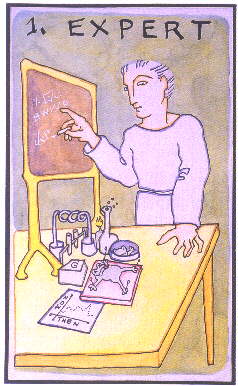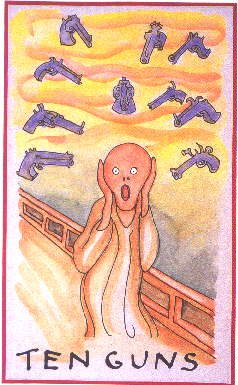|
|
 PoMo
Tarot PoMo
Tarot
- artist and author: Brian
Williams
- publisher: Harper Collins
- first appeared: 1994
This deck is currently out of print, but copies may
still be obtained from some sellers.
Postmodernism is a philosophical movement that sees
"truth" as a kind of political implement rather an objective
model of reality. For the postmodernist, reality itself is
just as diverse, boisterous, manipulative, and
attitude-filled as is the patchwork of human cultures that
create it. In the cacophonous postmodern universe, anyone
attempting to stake out some stable ground and claim a
privileged perspective becomes a target for
"deconstruction"--an academic demonstration that the
foundations upon which one has built are just rickety
self-serving contrivances, no different than anyone
else's.
Whatever one makes of postmodernism as a serious
philosophical stance, one cannot help but take a certain
wry, cynical pleasure in the tribulations of the postmodern
world in which we live. We no longer have a monolithic
culture, and each ideological faction has its own
pomposities and cherished absurdities. Ironically,
postmodern writers themselves seem especially easy targets,
with their opaquely pretentious jargon-drenched prose and
their inscrutably humorless insensitivity to the ironies of
their own positions. In the postmodern world, the serious
matter of making sense of life is no longer the prerogative
of a central cultural authority; it's been "deregulated" and
become a free-for-all of manic hawkers and raving
demagogues.
 The
irony of postmodern life is also reflected in the
proliferation of tarot decks. Each is supposed to summarize
the human condition in 78 symbolic images, each is supposed
to be a universal language of the soul. Well, this universal
language seems to have an incredible number of
dialects! Hundreds of tarot decks are available for
purchase, each one firmly planted in its own symbolism. The
postmodernist sees yet another example of the politics of
truth . . . perhaps an especially ironic one, given tarot's
connotation of deep, ageless wisdom. The
irony of postmodern life is also reflected in the
proliferation of tarot decks. Each is supposed to summarize
the human condition in 78 symbolic images, each is supposed
to be a universal language of the soul. Well, this universal
language seems to have an incredible number of
dialects! Hundreds of tarot decks are available for
purchase, each one firmly planted in its own symbolism. The
postmodernist sees yet another example of the politics of
truth . . . perhaps an especially ironic one, given tarot's
connotation of deep, ageless wisdom.
Tarot artist and author Brian Williams has answered irony
with irony. He has deconstructed the traditional tarot,
demystifying its classic symbolism through irreverent
modernization: swords become guns, coins become bills, the
Chariot is an armored tank, and the Sun is now a tanning
lamp. But that witty pose is just the opening act in this
richly layered performance. Take a look, for example, at one
of my favorite cards from the deck: Mom, a.k.a. The
Empress. Her orb and scepter have become pie and rolling
pin. Here we have, first of all, a witty spoof on the
ubiquitous tarot pop-psychology that sees the Empress as the
archetypal mother. In answer to "I am a fertile garden in
which creativity can be nurtured to fruition" (Empress
card affirmation from Mary Greer's Tarot for Your
Self), Mom seems to offer "Finish your broccoli". Yet a
quick revisiting of childhood memories informs us that the
rolling pin and scepter are not that different after all.
One is left with feeling that after Brian the witty brat has
broken the cathedral window and climbed through it with
iconoclastic bravado, he nevertheless finds himself standing
in a very familiar place--much to his own delight.
 And
that is the brilliance of this deck. The tarot, perhaps, is
something like the ouroboros, remaining unchanged
even as it devours itself. Instead of all this cleverness
undermining and transforming the tarot, instead it is the
cleverness that is undermined and transformed! The Joke
twists itself and becomes the Truth, and the tarot remains
the tarot. And
that is the brilliance of this deck. The tarot, perhaps, is
something like the ouroboros, remaining unchanged
even as it devours itself. Instead of all this cleverness
undermining and transforming the tarot, instead it is the
cleverness that is undermined and transformed! The Joke
twists itself and becomes the Truth, and the tarot remains
the tarot.
The minor arcana in the PoMo tarot are all based on
famous works of art, mostly from the last two centuries.
Here, too, we see the same irony at work. These are
paintings that have shaped the modern identity, icons of our
epoch. Williams revisions them in delightful, provocative
ways, so that we see the originals with a freshness that is
sure to raise a smile, but is often strangely moving as
well. Again, we are led round a strange loop that brings us
back to our starting point, but with a dizzy feeling of
having watched everything turn inside out and then right
itself again.
The book that accompanies the deck is a treasure. It is
written in a tongue-in-cheek style that gently spoofs both
postmodernist and tarot pretensions, but still conveys a
plethora of remarkable insights about the cards. Perhaps it
is only when we give up all hope of being taken seriously
that we are free to draw out the best we have to offer. (The
book has the best, most succinct account of the meaning of
the Fool that I have ever read.) The descriptions of the
minor arcana include short but illuminating discussions of
the original works of art on which they are based, giving
each card a cultural context that is rewardingly enriching
and intriguing.
 I
bought the PoMo Tarot more to admire than to use. I expected
it to be something like the local celebrity at the cocktail
party--witty, erudite, and entertaining but worthless for
sweeping the floors or changing the litter box. After some
getting-acquainted work, though, I discovered that the PoMo
Tarot has a unique talent. It's the only deck that seems to
understand what my TV set does to my brain. (Perhaps
it's hooked into some astral plane fiber-optic cable link to
Andy Warhol and Marshall McLuhan.) The PoMo Tarot is the
only deck I use for current events reading, and that is
the only type of reading I do with it. (I use my own
current events spread for reading
the cards.) I
bought the PoMo Tarot more to admire than to use. I expected
it to be something like the local celebrity at the cocktail
party--witty, erudite, and entertaining but worthless for
sweeping the floors or changing the litter box. After some
getting-acquainted work, though, I discovered that the PoMo
Tarot has a unique talent. It's the only deck that seems to
understand what my TV set does to my brain. (Perhaps
it's hooked into some astral plane fiber-optic cable link to
Andy Warhol and Marshall McLuhan.) The PoMo Tarot is the
only deck I use for current events reading, and that is
the only type of reading I do with it. (I use my own
current events spread for reading
the cards.)
Every day, the mass communications media bombard us with
an overwhelming crosstalk of reconstituted reality. If you
doubt that we live in a postmodern world, where clashing
agendas reshape the truth minute to minute, and where being
alive means being overloaded with information that becomes
obsolete long before it can be assimilated, just turn on
your TV. Only the PoMo tarot can lie in the cathode rays
without melting. It was born there. When I get feeling
desensitized and pegged out by current events, I pull out my
PoMo Tarot and let it tease out some focus from the
maelstrom. It's restorative--every bit as important to one's
well-being as the money, relationship, and life-purpose
issues many people use tarot cards to clarify.
The PoMo Tarot is one of a kind. Having found its niche
in my world, it has become utterly irreplaceable.
|